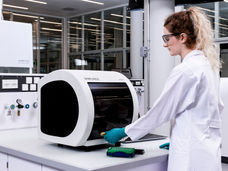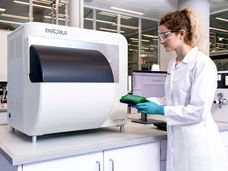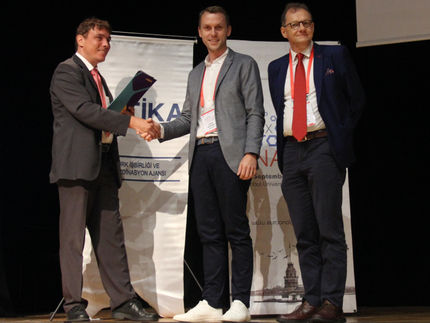Heinrich Emanuel Merck Award for Analytical Science Goes to Professor Francesco Ricci
Recognition of young researchers who develop new methods in chemical analysis
Merck announced that Professor Francesco Ricci from the University of Rome, Tor Vergata, Italy, will receive the 2017 Heinrich Emanuel Merck Award for Analytical Science. The Italian chemist will receive the recognition worth €15,000 for his ground-breaking development of nature-inspired DNA-based nanodevices for sensing applications. The award ceremony will take place today within the scope of the analytical conference Euroanalysis at the Stockholm University in Sweden.
“Professor Ricci developed an innovative, highly selective bio-based assay-tool, which offers a crucial added value for rapid and inexpensive detection of biomarkers. It is relevant for medicinal research and will improve the quality of human life,” explained Klaus Griesar, head of science relations at Merck. The awardee studied strategies of nature to develop sensors for diagnostic applications that employ the same mechanisms of biomolecular receptors. One “detection”-strategy of these receptors is a binding-induced conformational change. The shift of conformation occurs through the binding of a target molecule. Based on this natural recognition mechanism, Ricci’s research group used synthetic DNA oligonucleotides to develop optical and electrochemical sensors. These analytical devices are enabled to detect a wide range of antibodies, proteins and further analytes relevant in medicinal research. According to the jury the elucidated method presents a crucial advantage, as the detection of such markers originally required multiple steps, component-intensive processes and sophisticated laboratory equipment. In contrast, Ricci’s single-step method offers a rapid and inexpensive detection while still providing high selectivity.
Born in 1977, Ricci studied chemistry at the University of Rome, Tor Vergata, and the University of Lund in Sweden. He earned his PhD degree in Analytical Chemistry at the University of Rome, Tor Vergata, in 2005 for his thesis on “Prussian Blue”-based sensors and biosensors. A year later, he became Senior Researcher at the Chemistry Department of the University of Rome, Tor Vergata. From 2006 to 2013, Ricci spent several visiting periods - two years in total - as a post-doc researcher in the Chemistry and Biochemistry Department at the University of California, Santa Barbara (UCSB), United States. In June 2013, he filled the position as Visiting Professor in the same department at the UCSB supported by the Marie Curie Outgoing Fellowship. Since April 2014, Ricci is Associate Professor at the Laboratory of Biosensors and Nanomachines of the Chemistry Department at the University of Rome, Tor Vergata.
Since 1988, the Heinrich Emanuel Merck Award has been recognizing scientists under the age of 45 whose work focuses on new methods in chemical analysis and the development thereof in applications aimed at improving the quality of human life, for example in fields such as life science, environmental protection and the biosciences.
Topics
Organizations
Other news from the department business & finance
These products might interest you

Octet R2 / Octet R4 / Octet R8 by Sartorius
Full power on 2, 4 or 8 channels: Label-free and GxP-compliant analysis of molecular interactions
Innovative label-free real-time protein quantification, binding kinetics and rapid screenings

Octet RH16 and RH96 by Sartorius
Efficient protein analysis for process optimisation and manufacturing control in high-throughput
Label-free protein quantification and characterization of protein-protein interactions

Octet SF3 by Sartorius
Surface Plasmon Resonance (SPR) using Single Dynamic Injections for Kinetics and Affinities
Curvature is Key - Adding a ‘Third Dimension’ to the Binding Curve

Get the analytics and lab tech industry in your inbox
By submitting this form you agree that LUMITOS AG will send you the newsletter(s) selected above by email. Your data will not be passed on to third parties. Your data will be stored and processed in accordance with our data protection regulations. LUMITOS may contact you by email for the purpose of advertising or market and opinion surveys. You can revoke your consent at any time without giving reasons to LUMITOS AG, Ernst-Augustin-Str. 2, 12489 Berlin, Germany or by e-mail at revoke@lumitos.com with effect for the future. In addition, each email contains a link to unsubscribe from the corresponding newsletter.


























































